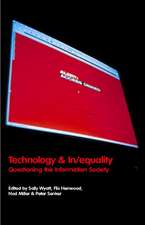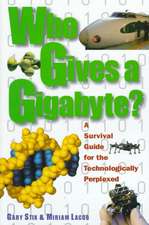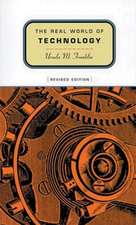Machines That Become Us: The Social Context of Personal Communication Technology
Autor James E. Katzen Limba Engleză Paperback – 30 sep 2006
| Toate formatele și edițiile | Preț | Express |
|---|---|---|
| Paperback (1) | 441.91 lei 43-57 zile | |
| Taylor & Francis – 30 sep 2006 | 441.91 lei 43-57 zile | |
| Hardback (1) | 787.97 lei 43-57 zile | |
| Taylor & Francis – 31 dec 2002 | 787.97 lei 43-57 zile |
Preț: 441.91 lei
Nou
Puncte Express: 663
Preț estimativ în valută:
84.56€ • 88.51$ • 70.38£
84.56€ • 88.51$ • 70.38£
Carte tipărită la comandă
Livrare economică 31 martie-14 aprilie
Preluare comenzi: 021 569.72.76
Specificații
ISBN-13: 9781412806213
ISBN-10: 1412806216
Pagini: 348
Ilustrații: 1
Dimensiuni: 152 x 229 x 22 mm
Greutate: 0.59 kg
Ediția:1
Editura: Taylor & Francis
Colecția Routledge
Locul publicării:Oxford, United Kingdom
ISBN-10: 1412806216
Pagini: 348
Ilustrații: 1
Dimensiuni: 152 x 229 x 22 mm
Greutate: 0.59 kg
Ediția:1
Editura: Taylor & Francis
Colecția Routledge
Locul publicării:Oxford, United Kingdom
Cuprins
1: Introduction; 1: Theoretical Perspectives; 2: Do Machines Become Us?; 3: Understanding Information and Communication Technology and Infrastructure in Everyday Life: Struggling with Communication-at-a-Distance; 4: Domestication and Mobile Telephony; 5: Communication Technology and Sociability: Between Local Ties and “Global Ghetto”?; 6: The Human Body: Natural and Artificial Technology; 2: National and Cross-Cultural Studies; 7: Digital Divides of the Internet and Mobile Phone: Structural Determinants of the Social Context of Communication Technologies; 8: Social Capital and the New Communication Technologies; 9: Information and Communication Technology in Russian Families: Results of Sociological Research; 10: Face and Place: The Mobile Phone and Internet In the Netherlands; 11: Computer Anxiety Among “Smart” Dutch Computer Users; 12: The Social Context of the Mobile Phone Use of Norwegian Teens; 13: Two Modes of Maintaining Interpersonal Relations Through Telephone: From the Domestic to the Mobile Phone; 14: Culture and Design for Mobile Phones for China; 3: Subcultures, Technologies, and Fashion; 15: Outwardly Mobile: Young People and Mobile Technologies; 16: Breaking Time and Place: Mobile Technologies and Reconstituted Identities; 17: Crossbreeding Wearable and Ubiquitous Computing: A Design Experience; 18: Mobile Telephony, Mobility, and the Coordination of Everyday Life; 19: Soft Machine; 20: Aesthetics in Microgravity; 21: Piercings Tattoos, and Branding: Latent and Profound Reasons for Body Manipulations; 22: “Perhaps It is a Body Part”: How the Mobile Phone Became an Organic Part of the Everyday Lives of Finnish Children and Teenagers; Coda; 23: Bodies, Machines, and Communication Contexts: What is to Become of Us?
Descriere
Social critics and artificial intelligence experts have long prophesized that computers and robots would soon relegate humans to the dustbin of history






















